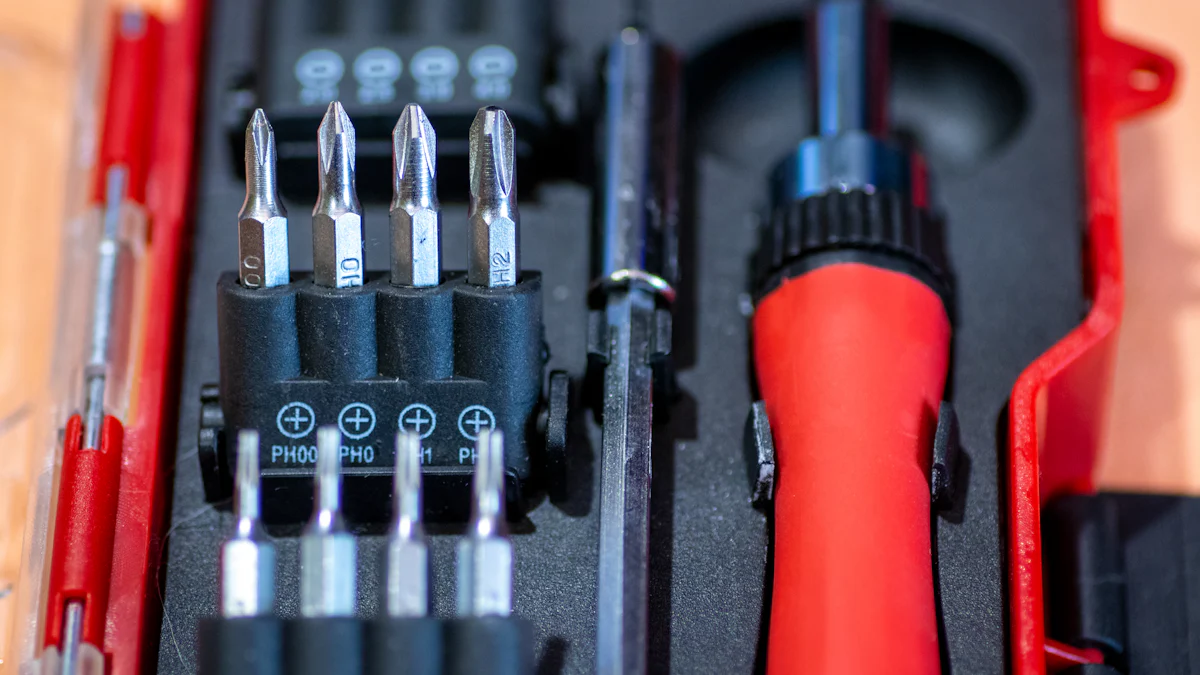
Discovering the World of Screwdriver Bits
Screwdriver bits are small, interchangeable accessories designed to fit into a screwdriver or drill. They come in various shapes and sizes, each tailored to a specific type of screw head. These bits are an essential tool for any DIY enthusiast, allowing for efficient and precise fastening of screws in a wide range of materials.
In the realm of DIY projects, screwdriver bits play a crucial role in ensuring that screws are securely fastened. Whether it’s assembling furniture, installing fixtures, or repairing electronics, having the right screwdriver bit can make all the difference in the outcome of your project. The versatility and practicality of these bits make them indispensable for any home improvement or repair task.
My first encounter with screwdriver bits was during a furniture assembly project. I quickly realized that using the correct bit made the process much smoother and prevented any damage to the screws or furniture components. This experience taught me the importance of having a diverse collection of screwdriver bits on hand for various tasks around the house.
Types and Uses of Screwdriver Bits

Screwdriver bits come in a variety of types, each designed to fit specific screw heads and serve different purposes. Understanding the common types of screwdriver bits is essential for any DIY enthusiast looking to tackle various projects around the house.
The Common Types You Should Know
When it comes to screwdriver bits, there are several common types that every DIYer should be familiar with. Flathead and Phillips are among the most widely used types. Flathead bits have a single blade that fits into slotted screws, while Phillips bits feature a cross-shaped tip designed for Phillips head screws. Additionally, there are other popular types such as Pozidriv, Torx, and Allen bits, each tailored for specific screw types and offering optimal engagement.
In addition to these standard types, there are specialty bits available for more specialized tasks. These include square type (GR), TX, and TPX bits, which cater to unique screw designs commonly found in electronics, machinery, and automotive applications. Having access to a diverse range of specialty bits ensures that you’re prepared for any unconventional fastening needs that may arise during your DIY endeavors.
Matching Bits to Projects
Selecting the right screwdriver bit is crucial when embarking on different projects. For basic tasks like furniture assembly or minor electronics repairs, standard flathead and Phillips bits are often sufficient. However, when tackling advanced DIY projects involving complex machinery or specialized equipment, having access to specialty bits becomes essential for ensuring precise and secure fastening.
By understanding the compatibility between screw heads and corresponding bit shapes, DIYers can confidently choose the appropriate tools for their specific projects. Whether it’s assembling a new bookshelf or delving into intricate electronic repairs, having the right screwdriver bit at your disposal can significantly streamline your DIY experience.
Choosing the Right Screwdriver Bit for Your Project
Understanding Bit Materials and Coatings
When it comes to screwdriver bits, the choice of materials and coatings significantly impacts their performance and durability. S2 tool steel is a popular material known for its exceptional strength and longevity, making it well-suited for heavy-duty applications. Additionally, these bits are often coated with black phosphate, which enhances their resistance to corrosion and wear.
The material composition of screwdriver bits plays a crucial role in determining their suitability for different tasks. For instance, titanium screwdriver bits are renowned for their durability, outperforming stainless or tool-grade bits in demanding work environments. On the other hand, S2 alloy steel stands out as an ideal choice for heavy-duty work due to its extended service life and robustness.
Size and Compatibility: Ensuring a Perfect Fit
Selecting the right size and package quantity of screwdriver bits is essential to ensure compatibility with your tools and fasteners. Many screwdriver bits feature universal hex shank designs, allowing them to fit common drills seamlessly. This universal compatibility simplifies the process of finding suitable bits for various projects, eliminating the need for multiple specialized tools.
When choosing screwdriver bit sizes, it’s important to consider the specific requirements of your projects. Opting for a set that includes a diverse range of sizes ensures that you’re prepared for screws of varying dimensions. Additionally, paying attention to the package quantity is crucial, as having an ample supply of commonly used bit sizes can prevent interruptions during your DIY tasks.
By understanding the significance of bit materials, coatings, sizes, and package quantities, DIYers can make informed decisions when assembling their ultimate screwdriver bit set.
Wrapping Up
Putting Your Knowledge to Work
As we conclude our exploration of screwdriver bits, it’s time to put your newfound knowledge into action. Building your ultimate screwdriver bit set is the first step towards enhancing your DIY endeavors. Consider the diverse range of projects you undertake and invest in a comprehensive set that includes standard flathead and Phillips bits, as well as specialty bits for unique fastening needs. By doing so, you’ll be well-prepared to tackle any task that comes your way.
When it comes to storage and maintenance, keeping your screwdriver bits organized and easily accessible is essential for efficiency. Utilize labeled organizers or cases to store your collection systematically, ensuring that you can quickly locate the right bit when needed. Additionally, regular maintenance, such as cleaning and inspecting for wear, will prolong the lifespan of your bits and maintain their performance.
Final Thoughts
In conclusion, the journey of selecting the right screwdriver bit goes beyond mere tool selection; it requires attention to compatibility, material quality, and structural nuances. Now equipped with comprehensive knowledge about screwdriver bits, you can make informed choices to elevate the quality of your DIY projects.
To complement your venture into the world of electric screwdriving, consider integrating innovative tools like the Fanttik E1 Max into your arsenal. This exceptional screwdriver stands as a beacon of precision and efficiency, capable of transforming every project into a seamless endeavor driven by excellence. Whether you’re a consummate professional or a hobbyist, embracing the correct screwdriver bit alongside the efficiency of Fanttik E1 Max will undoubtedly elevate your DIY experience.
Happy screwdriving!
Now that we’ve covered all aspects of screwdriver bits, it’s time to embrace DIY challenges with confidence and continue learning on this exciting journey!
